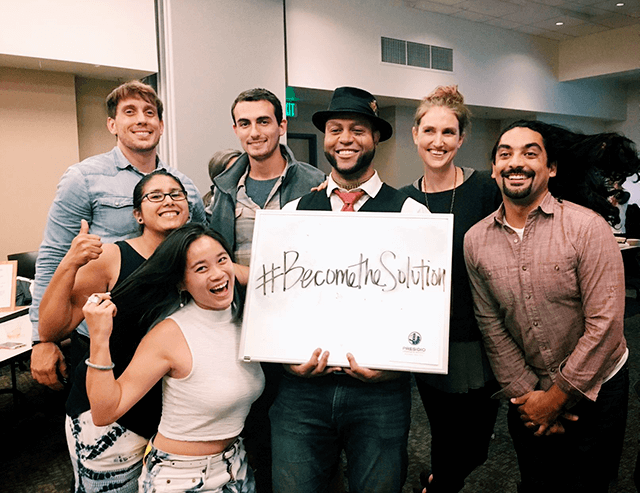Each summer, the Presidio Graduate School team works on annual goals to take us through the next fiscal year to align with our top organizational goals and three-year strategic plan. Last summer, we created Presidio’s first official DEI workgroup, which launched a student advisory committee under the leadership of faculty advisor Donna LaSala. Last academic year, we set goals around—and achieved—a significant increase in DEI training, student events, student affinity groups, and academic commitment by including a DEI statement on all course syllabi.
This summer, we took a more holistic approach to DEI goal-setting. We asked our key constituents and departments to integrate DEI goals into their work, and we supported our students to create complementary student-led DEI goals. We will offer an interim report on accomplishments, roadblocks, and next steps this winter.
I’m pleased to present the 2020-21 Presidio administration DEI goals to you below. I am also proud to share the Student DEI Advisory Committee’s goals, presented in their own words.

Presidio Administration diversity, equity, and inclusion goals
At Presidio, we see diversity, equity, and inclusion as integral to all of our work. While it can be difficult (and sometimes even counterproductive) to isolate specific goals as “DEI,” we also believe it is crucial to call out our specific actions and goals related to this work as we continue to integrate it into our strategy and operations. The following list captures some of our main initiatives that support our overarching goal to nurture and spark higher levels of diversity, equity, and inclusion into the Presidio community. Each of the following workstreams includes metrics and key deliverables that we have integrated into our overall goal setting, planning, and performance management process.
Learning. We aspire to equip all Presidio graduates with the ability to effectively lead equitable and inclusive teams, organizations, and movements. This year, our academic team commits to developing and piloting tangible learning outcomes around racial equity in our curriculum, which we will reinforce across multiple classes. Moreover, we commit to increasing classroom representation from underrepresented groups (inclusive of faculty, speakers, TA’s, and authors).
Community. We aspire for Presidio to be a radically inclusive community that welcomes all community members to bring their full selves to Presidio Graduate School safely and authentically. This year, our staff will double down on helping students build a community that is inclusive of all individuals, with the co-creation of a “community norms” document as a first step. In addition, we will support the student advisory committee to lead at least one effective DEI event per semester, and support our Social Justice Advisor (Cecily Joseph) to lead two high-quality community events per year.
Admissions and enrollment. We aspire for Presidio to double the number of students from underrepresented racial and ethnic groups, and to welcome in any student regardless of ability to pay. Over the next several years, our team would like to see a significant increase in student enrollment from underrepresented racial groups, as well as from individuals from lower socio-economic backgrounds that may not traditionally have the opportunity to attend graduate school. As such, we are increasing the philanthropic and institutional funding committed to needs-based scholarships and developing diverse pipeline and outreach strategies to reach a more diverse applicant population.
Presidio Student DEI Advisory Committee goals
Presidio Graduate School’s Student Diversity, Equity, and Inclusion Advisory Committee (SDEIAC) is committed to supporting the important ongoing work of our graduate community to dismantle oppressive systems that harm people and our planet. We appreciate Presidio’s Administration’s own commitments relevant to their institutional stewardship, and their regular invitations for the SDEIAC’s feedback on those efforts. As our community enters this school year amidst ongoing climate change, a global pandemic, a watershed in liberation movements (especially for black, trans, and working class people), and an American presidential election, we look to each other in solidarity and hope.
The SDEIAC recognizes that systemic change takes time, energy, and accountability. We seek to balance clear intentions with transparent outcomes, whatever they may be. The SDEIAC has set the following goals for 2020-2021:
- Facilitate safer spaces for black, indigenous, and other people of color (BIPOC), trans, and queer people. We will welcome our newest students at their Orientation with our culture and norms by sharing terminology, discussing critical DEI considerations in all business and governance work, and offering resources for more learning. We will also regularly host events (e.g., Community Joy Hours) within our community to learn, reflect, and celebrate. Further, we will continue to support student resource groups. Some that already exist include:
-
- Black Students
- Asians and Pacific Islanders (AAPIs)
- People of Color (POCs)
- Queersidio
- White Students for Anti-Racism
- Recommend and invite more BIPOC, trans, and queer people into our community as speakers, faculty, and students. We will expand our network to intentionally include under-represented communities in business and government. Most of this will be done through advisory work with Presidio staff and faculty.
- Lower financial barriers for all prospective students. We will explore ways to fund the education of passionate changemakers in our community, including, but not limited to scholarships and donations. This will be done in coordination with the incoming Presidio Development Officer.
- Re-imagine the sustainability industry and higher education institutions as tools for dismantling oppression. We will continue working with the Provost to meaningfully integrate student voice into the ongoing curriculum development process, and to center reading perspectives and people fighting oppression in every course discussion, assignment, and project.

